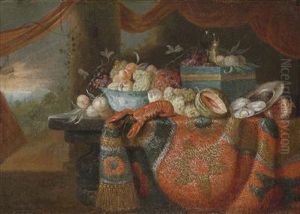Jan Baptist Lust Paintings
Jan Baptist Lust was a Flemish composer and organist active during the Baroque period. Born in 1650 in Belgium, Lust's exact birthplace is not well-documented, but he was known to have been active in Antwerp, which was a significant center for the arts in the 17th century. His contributions to the musical landscape of his time were primarily in the realm of church music, where he composed a range of works for organ and vocal ensembles.
Lust received his musical education from prominent figures of his time, which was common for composers of the Baroque era. He became a skilled organist and was appointed to prestigious positions at various churches, which was a testament to his abilities and reputation. His compositions often reflected the rich, textured style of the period, with an emphasis on counterpoint and expressive harmonic progressions.
Throughout his career, Jan Baptist Lust's music would have been performed in religious settings, serving both liturgical functions and the entertainment of churchgoers. Despite his apparent success during his lifetime, much of Lust's work has not survived or has been overshadowed by his more famous contemporaries such as Johann Sebastian Bach and George Frideric Handel.
Lust passed away in 1729. Unfortunately, as with many composers of the era, his music did not maintain a strong presence in the repertoire. Today, his contributions are recognized by those with a deep interest in the Baroque period and Flemish music history. Scholars and performers interested in the breadth of Baroque music sometimes explore Lust's compositions, offering a more complete understanding of the era's musical diversity.
